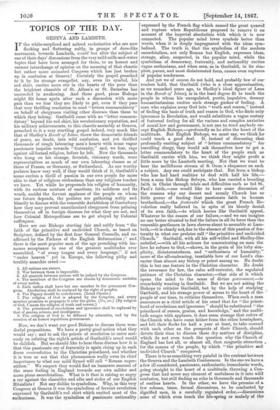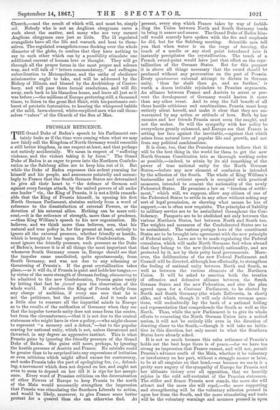TOPICS OF THE DAY.
GENEVA AND LAMBETH.
IF the white-surpliced and mitred ecclesiastics who are now flocking and fluttering softly, in groups of dove-like movement, towards Lambeth, would but alter the subject of one of their days' discussions from the very mild milk-and-water topics that have been arranged for them, to an honest and earnest interchange of opinion on the meaning of that chaotic but rather more animated Congress which has just broken up in confusion at Geneva! Certainly the gospel preached to it by its strange evangelist, nay, even its symbol, his red shirt, excites more stir in the hearts of the poor than the brightest chasuble of St. Alban's or St. Barnabas has succeeded in awakening. And these good, pious Bishops might flit home again after such a discussion with more gain than we fear they are likely to get, even if they pass that very thrilling resolution to send " letters commendatory" on behalf of clergymen visiting other dioceses than those to which they belong. Garibaldi came with no "letter commen- datory" beyond his red shirt, his revolutionary reputation, and his military achievements, to this chaotic assembly at Geneva, preached to it a very startling gospel indeed, very much like that of Shelley's Revolt of Islam, threw the democratic friends of peace, no doubt, into wild confusion, and yet thrilled thousands of rough labouring men's hearts with some vague passionate impulse towards "fraternity," and, we fear, rage against all formal religion, before he left. Now the thousands who hung on his strange, feverish, visionary words, were representatives as much of our own labouring classes as of those of France, or Germany, or Switzerland. As our worthy prelates know very well, if they would think of it, Garibaldi's name excites a thrill of passion in our own people far more akin to that of religious enthusiasm than any religious teacher we have. Yet while he propounds his religion of humanity, with its curious mixture of emotions, its mildness and its wrath, amidst the fervent applause of the people on whom our future depends, the prelates are gathering softly and blandly to discuss with the venerable Archbishop of Canterbury how they may prevent unauthorized clergymen from palming themselves off in foreign dioceses for what they are not, and how Colonial Metropolitans are to get obeyed by Colonial suffragans.
Here are our Bishops starting fair and softly from " the faith of the primitive and undivided Church, as based on Scripture, defined by the first four General Councils, and re- affirmed by the Fathers of the English Reformation ;" and there is the most popular man of the age preaching with im- mense acceptance to one of the greatest multitudes ever assembled, " of every tongue and every language," if not " under heaven " yet in Europe, the following pithy and terribly anarchic creed :-
1. All nations are sisters.
2. War between them is impossible. 8. All quarrels between nations will be judged by the Congress. 4. The members of the Congress are chosen by democratic societies of every nation. 5. Each nation shall have but one member in the permanent Con- gress. Absolutism shall be replaced by the right of peoples. 6. The Papacy should be overthrown. (Loud Cheers.) 7. The religion of God is adopted by the Congress, and every member promises to propagate it over the globe. (No, no.) (By religion of God, I mean the religion of truth and reason.) 8. The priesthood of revelations and ignorance shall be replaced by that of genius, science, and intelligence. 9. The religion of God to be diffused by education, and by the creation of an honest republican government.
Now, we don't want our good Bishops to discuss these won- derful propositions. We have a pretty good notion what they would say ; and to ask the priests of revelation to enter seri- ously on refuting the eighth article of Garibaldi's creed would be childish. But we should like to hear them discuss how it is that this passionate cry of fraternity is again rising up in such fierce contradiction to the Christian priesthood, and whether it is true or not that this phenomenon really owes its chief importance to what our mild Synod will call " Roman super- stition." We suspect they would find an immense amount of the same feeling in England towards our own milder and more pious sacerdotalism. What is it that is raising so angry a cry against the chasubles and albs and stoles of our English Ritualists Not any dislike to symbolism. Why, in this very Congress at Geneva it was the symbolism of fervent revolution expressed by Garibaldi's red shirt which excited most of the enthusiasm. It was the symbolism of passionate nationality expressed by the French flag which caused the great quarrel and rupture when Republicans proposed to remove it on account of the imperial absolutism with which it is now The popular mind loves symbols better than words, when it is deeply impregnated with the ideas sym- bolized. The truth is, that the symbolism of the modern. sacerdotalism, not only Roman but English, expresses ideas,. strange, alien, suspected, in the popular mind, while the symbolism of democracy, fraternity, and nationality excites. vague enthusiasm, and when seen, as in Garibaldi, in its sim- plest, purest, and most disinterested form, rouses even raptures. of popular tenderness.
And yet we of course do not hold, and probably few of our readers hold, that Garibaldi (who is a close approximation, as we remarked years ago, to Shelley's ideal figure 'of Leon in the Revolt of Islam), is in the least degree fit to teach the people in whom his unregulated, poetic, impulsive, dreamy humanitarianism excites such strange gushes of feeling. A. man who explains away God into " truth and reason," instead_ of finding the basis of truth and reason in God, who finds only ignorance in Revelation, and would substitute a vague ecstasy of fraternal feeling for all the various and complex anxieties. of moral law and government, is not one to teach anybody ex- cept English Bishops,—profoundly as he stirs the heart of the• multitude. But English Bishops, we must say, we think he- could teach a good deal. If, instead of discussing tlint, profoundly exciting subject of "-letters commendatory " for travelling clergy, they would ask themselves how to get letter commendatory to the heart of the people such as Garibaldi carries with him, we think they might profit a: little more by the Lambeth meeting. Not that we want to, hear the mellifluous stream of S. Oxon.'s eloquence on such a subject. Any one could anticipate that. But from a bishop. who has had hard realities to deal with half his life,— from a man like Bishop Selwyn, who has carried a brooding, faith in Christ through trials and difficulties such as fed St. Paul's faith,—one would like to hear some discussion of the reasons why our decent and seemly Church has sa little power of feeding that passionate faith in human brotherhood,—the fraternity which the great French Re- volution really believed in, in spite of its bloody denial of its own faith,—to which heroes like Garibaldi appeal- Whatever be the reason of our failure,—and we can imagine. no one better situated to feel the failure in all its force than the. venerable gentlemen in lawn sleeves about to assemble at Lam- beth,—it is clearly not, due to the absence of this passion of fra- ternity in what our prelates call "the primitive and undivided Church." Garibaldi, with all his self-willed and Shelley-like. unbelief, —with all his ardours for concentrating on man the. love he refuses to God,—shows, in the grain of his lofty sim- plicity, disinterestedness, and "enthusiasm of humanity," more of the all-embracing, insatiable love of our Lord's cha- racter than almost any bishop or priest among us. No doubt. this is but one feature in the Christian character. No doubt the reverence for law, the calm self-restraint, the regulated patience of the Christian character,—that side of it which opens the mind to the sense of divine government,—is remarkably wanting in Garibaldi. But we are not asking the. Bishops to criticize Garibaldi, but by the help of studying Garibaldi, and his strange power of access to the heart of the: people of our time, to criticize themselves. When such a man announces as a chief article of his creed that for "the priest- hood of revelations and ignorance " should be substituted " the. priesthood of reason, genius, and knowledge," and the multi- tude surges with applause, it does seem strange that rulers of the Church who have come hither from the other hemisphere,. and left their flocks for half a year at least, to take counsel with each other on the prospects of their Church, should devote their time to discuss these dry matters of discipline, which do not even touch the question why the Church of England has lost all, or almost all, that magnetic attraction . for the masses of the people, by which " the primitive an& undivided Church " conquered.
There is to us something very painful in the contrast between the Geneva and the Lambeth Conferences. In the one we have a a few ill considered, passionate, enthusiastic, iconoclastic words, going straight to the heart of a multitude, throwing a Con- gress that had never any element of usefulness in it into wild confusion, but still finding an echo in thousands and thousands- of restless hearts. In the other, we have the promise of a. few solemn, tame, formal discussions, to be conducted by dignified men, in a carefully regulated order,—discussions none of which even touch the life-spring or malady of the Church,—and the result of which will, and must be, simply mil. Nobody who is not an Anglican clergyman cares a rush about the matter, and many who are very earnest Anglican clergymen care just as little. The ill regulated evangelists have all the life and warmth and heat to them- selves. The regulated evangelists come flocking over the whole diameter of the globe, to confess that they have nothing to say to each other which can by a possibility stimulate one additional current of human love or thought. They will go ,through all the proper forms in the most proper and solemn way, and will talk of " letters commendatory," and suffragan subordination to Metropolitans, and the oaths of obedience missionaries ought to take, and will be addressed by the Bishop of Illinois, and blessed by the Archbishop of Canter- bury, and will pass three formal resolutions, and will flit away, each back to his blameless home, and leave all just as it was before ;—the millions of Europe preferring still, a thousand times, to listen to the great Red Shirt, with his passionate out- burst of patriotic fraternities, to hearing the whispered babble of the mild, lawn-sleeved, white-surpliced men who call them- selves "rulers" of the Church of the Son of Man.































 Previous page
Previous page